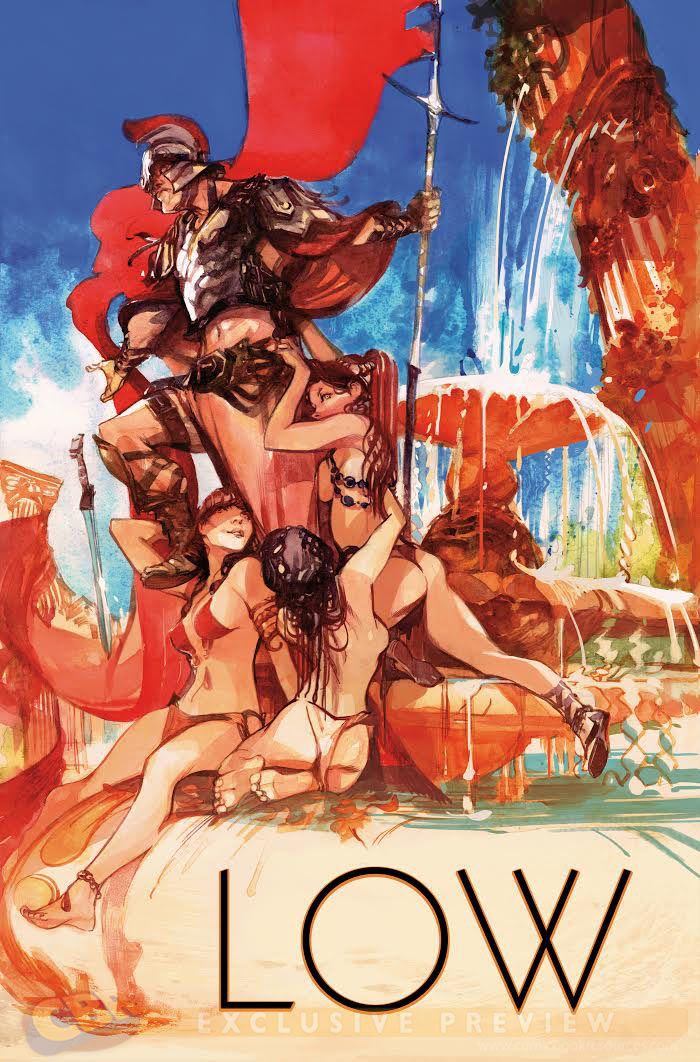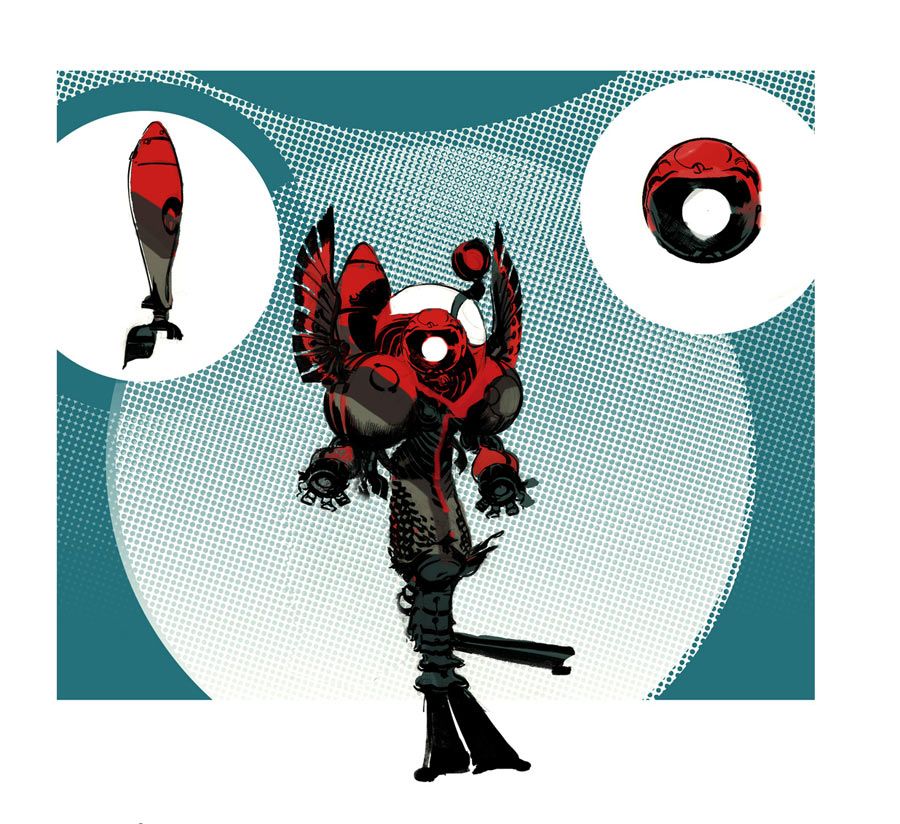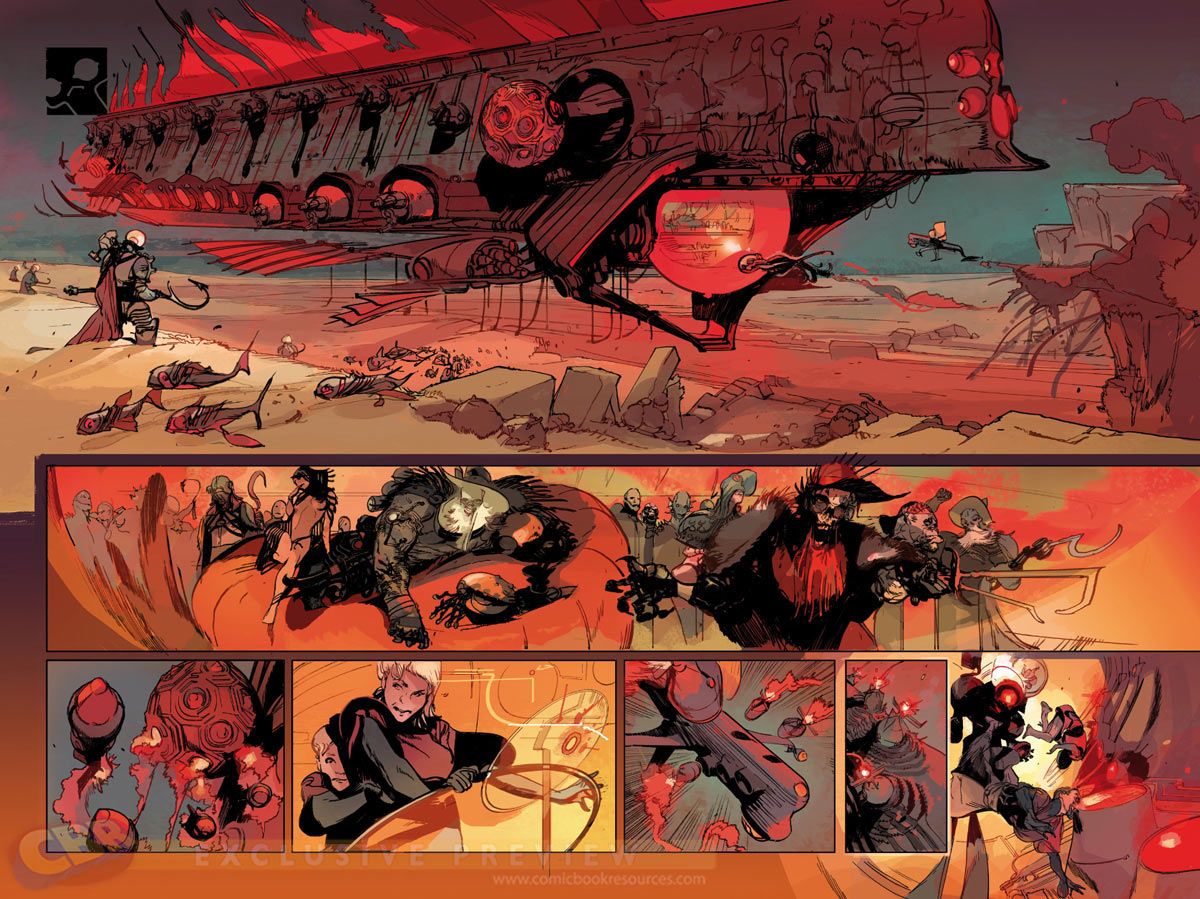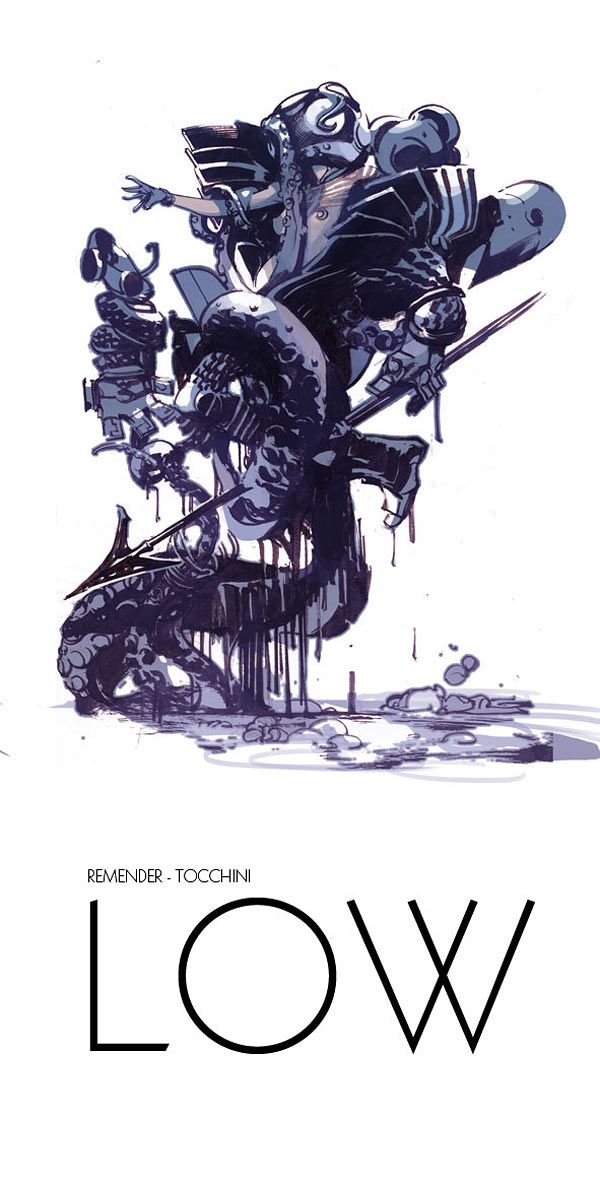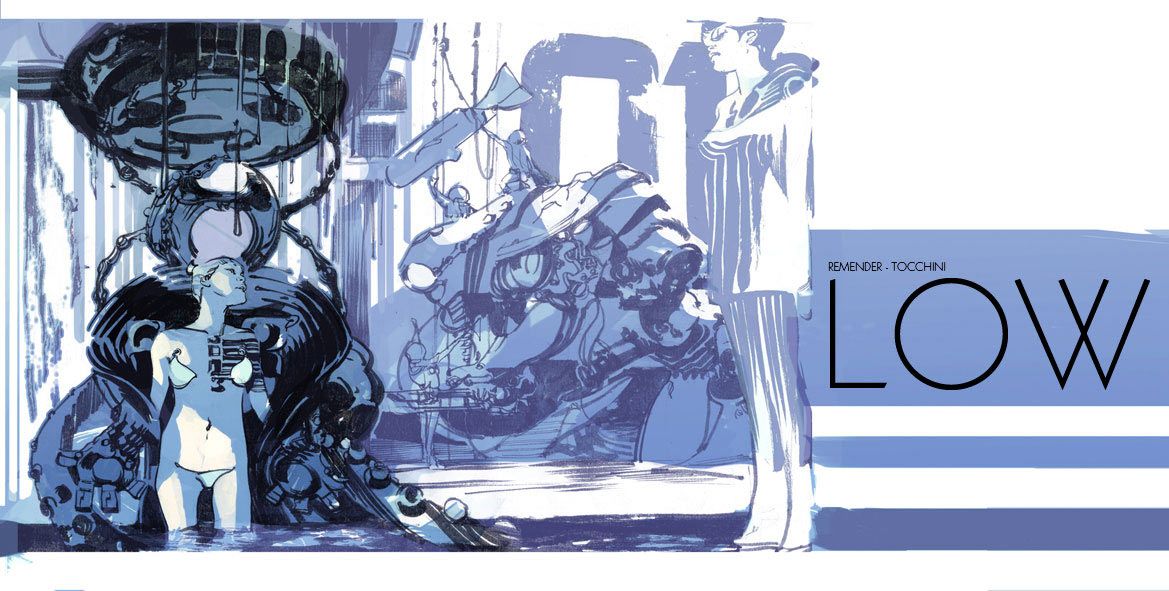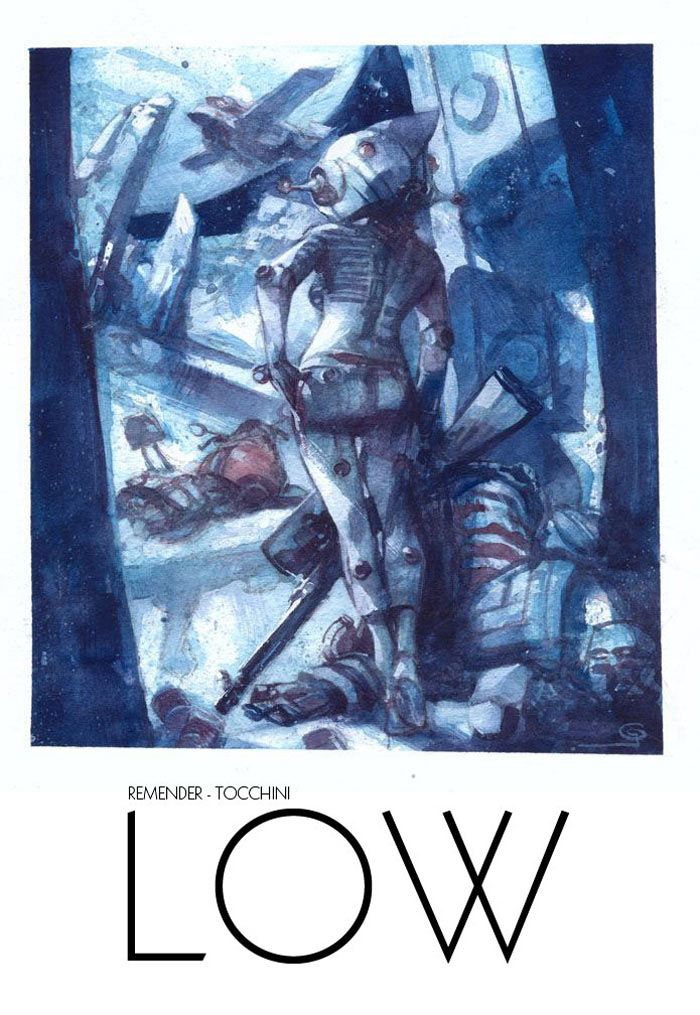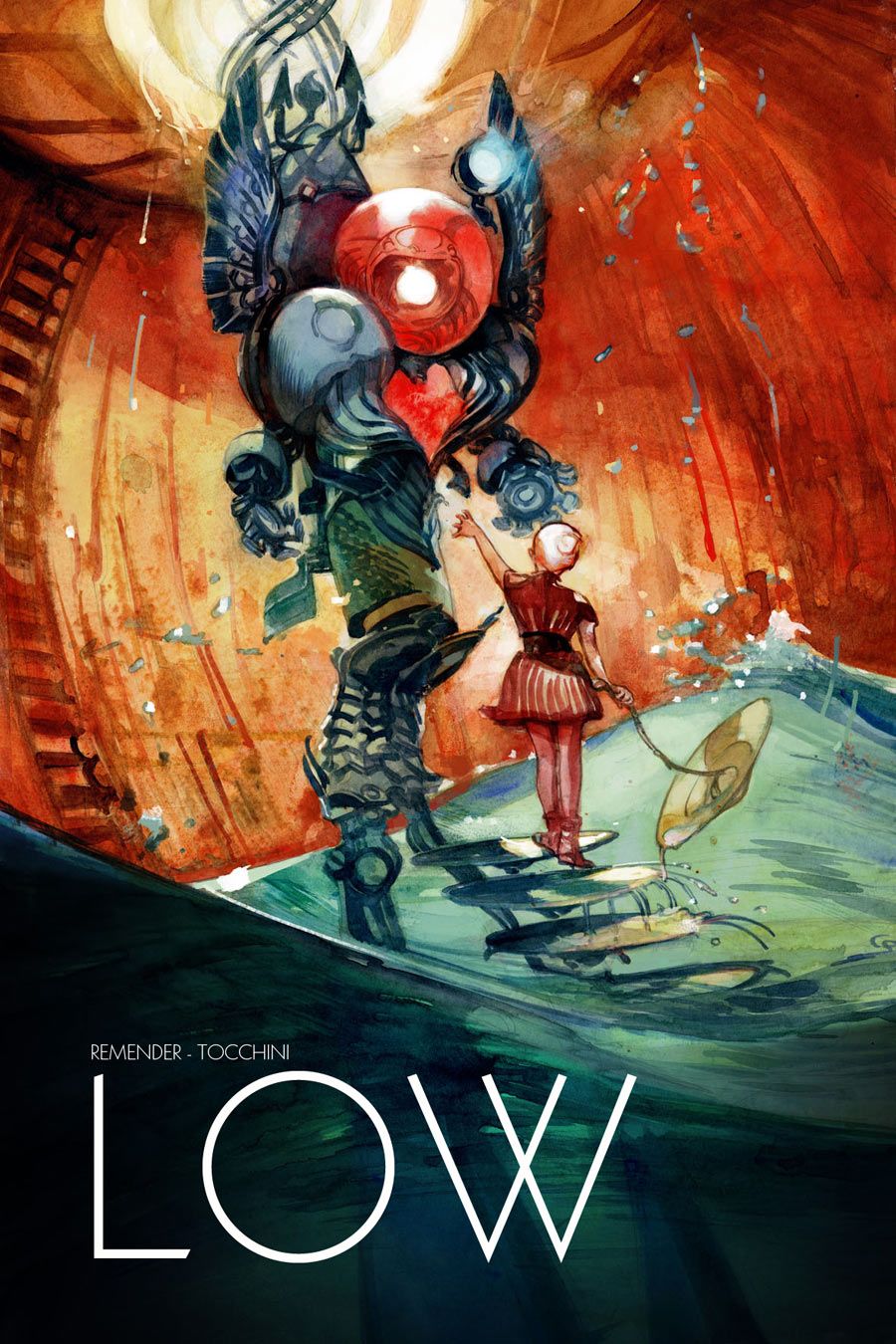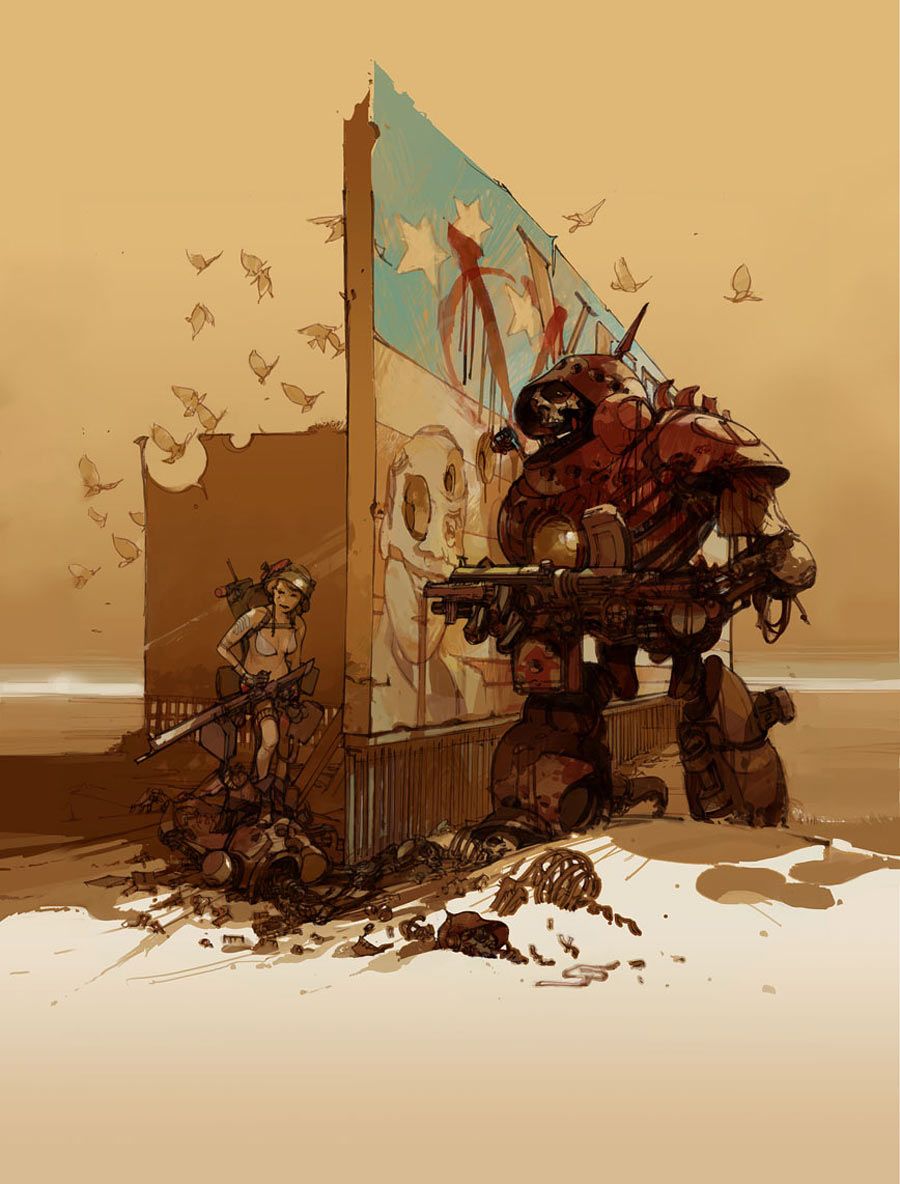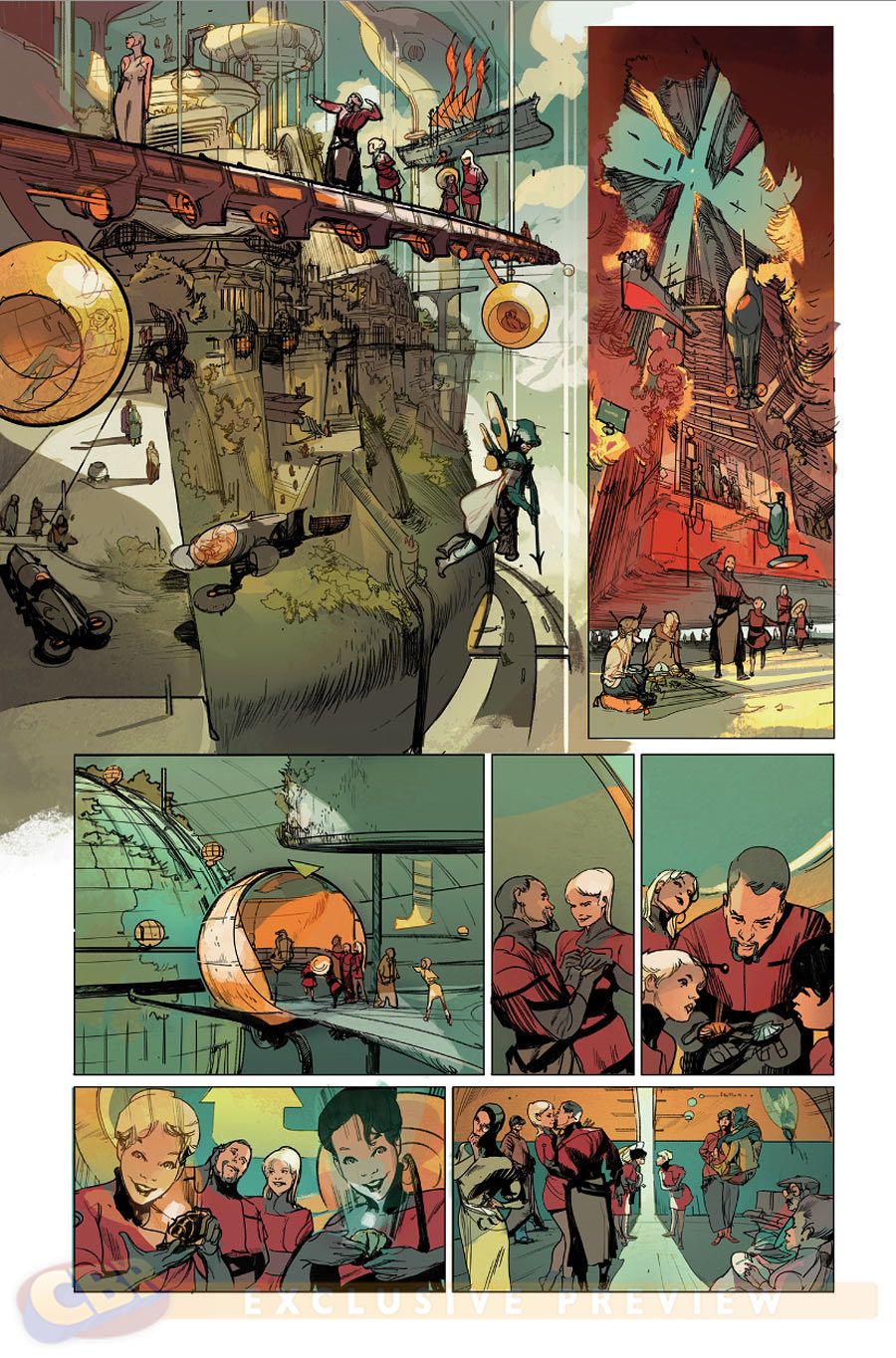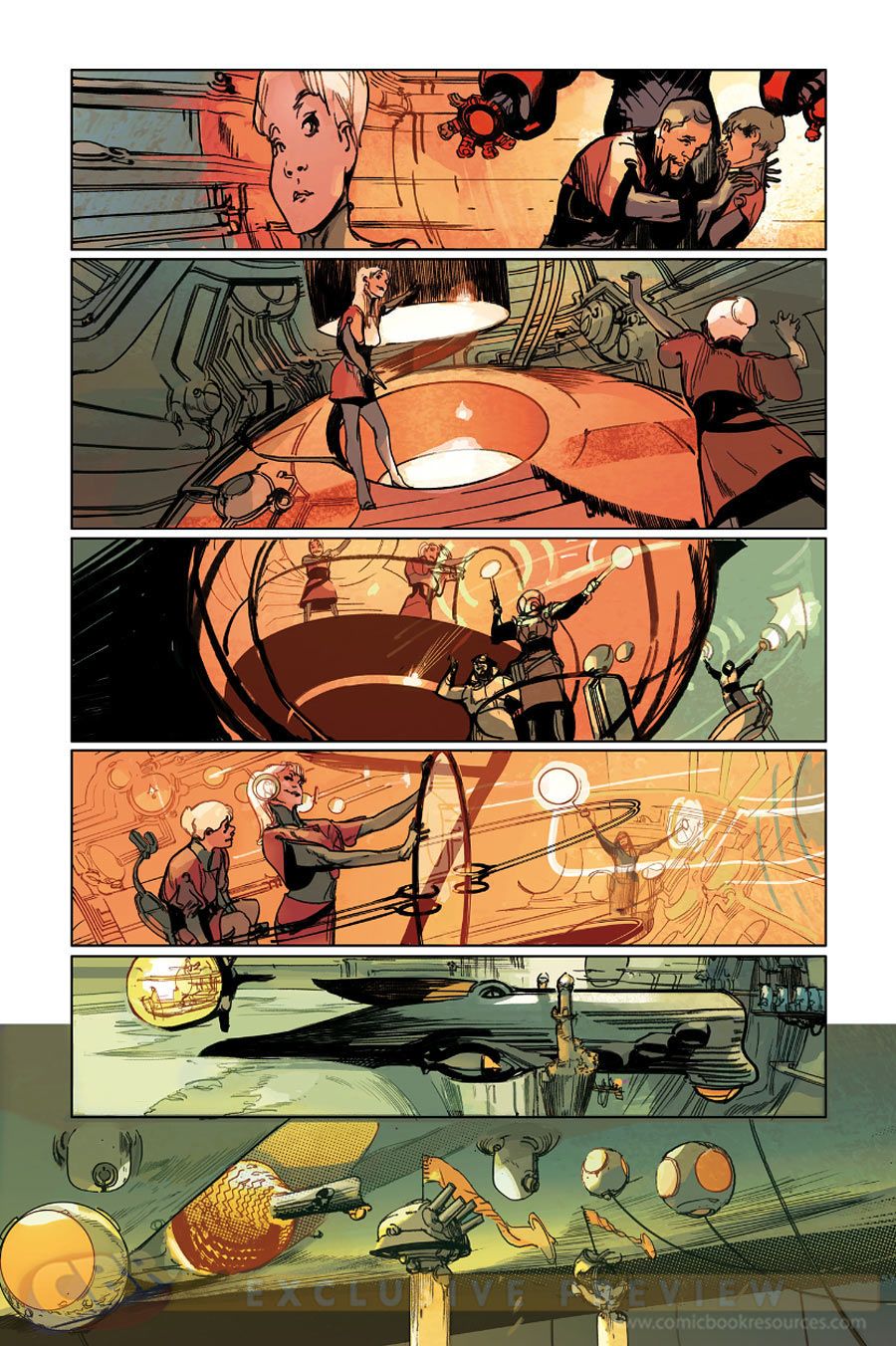Blending elements of quantum physics, science fiction and psychedelic fantasy, Rick Remender and Greg Tocchini's latest Image Comics series dives down to the ocean floor, and into the psyche of Remender himself. On the surface, "Low" sounds like fairly straightforward sci-fi: distant future, heat death of the world, mankind moves to the bottom of the ocean, irradiation, mutants, collapse of civilization and a quest for survival. But as CBR News dug deeper and deeper in our interview with the writer, it became clear how personal the work is for him.
"Low" takes place on the ocean floor, where Earth's two remaining cities are falling to pieces. The ruling class has given into lurid temptations of the flesh, while hopelessness, cynicism and apathy abound, the idea of hope and the practice of optimism almost completely abandoned. But when one last probe successfully returns to the Earth's surface, possibly with information about a new planet to occupy, both cities decide that they must retrieve it.
Rick Remender Gets Deep With "Low"
The speculative future of "Low" came from Remender's youthful discovery of the inevitable heat death of our world -- something he spoke with CBR News about during Image Expo 2014. And while the writer's other Image series, "Black Science" and "Deadly Class," stem from personal journeys Remender has taken, "Low" is a reflection of his longtime battle between faith and realism, optimism and pessimism, and the very nature of life.
CBR News re-visited the series with Remender, uncovering more about the characters who represent pieces of his own world view, how quantum physics inspired the spiritual aspect of "Low" and the way he keeps himself in check with a very personal editorial process.
We talked about "Low" a few months ago at Image Expo -- has anything significant changed since then?
Rick Remender: In terms of the story, it's nice, because this is something that Tocchini and I have talked about doing since we finished "The Last Days of American Crime" back in 2009/2010. It's had years of gestation that has enabled me to fill up files and files of ideas. When we got really serious and started to get to work on it about a year ago, I got on the phone to Sebastian Girner, our editor, and we spent a weekend taking that backlog of ideas and cherry-picking it. The nice thing now is that the heavy work is done. Depending on interest and popularity, I really could take this series 50 or 60 issues. To have that much stuff laid out in front of you and already have the game mapped is wonderful. It prevented any big, shocking changes to what we're doing.
Were there any ideas that had come up that were hard to leave behind?
Yeah, there always are -- killing the babies. [Laughs]

Once you pick a tight direction, you also have to recognize that there is a need for velocity in the first ten issues of any series. That velocity demands that you cut a lot of fat. Some stuff you can circle back around to, some stuff you can't, some of it you have to hit in a quick beat or a small caption that quickly gets the information across so you can keep moving. It's such a desperate and difficult job to keep an audience interested in a new series. Those first ten issues need to be very exciting, very emotional and give you a sense of the ideas. You also can't waste anyone's time for a single page. So we did have to cut a lot of things, but at the same time we also took the end goal -- which is the cast making their way to Earth's surface, the first humans to do so in tens of thousands of years -- we took that and pushed it back further than had originally been in my first outline. I realized that the fun of that, and everything that happens after they get to the surface, isn't something we have to rush to. We ended up picking up so many levels of the ocean and so many different civilizations and ramifications of the radiation -- slowing down really helps draw that out.
It's interesting to hear you mention your editorial process on this. What are some of the differences between what you experience editorially on creator-owned work and the work you do for Marvel?
The number one difference is that I have final say. I like having Sebastian. He's an editor who is a friend and someone I respect. I like having a different perspective; I like having the sounding board. He often has different opinions that I do, and I like that. We're in the middle of arguing over a beat in "Low" #3 right now, and we've had seven emails back and forth. That debate enforces that I am not being lazy, self-indulgent or telling a bullshit story, but in fact am telling a story that is well thought out where any decision we make was heavily scrutinized. If I have to defend my ideas to an editor, it forces me to solidify them in my own mind, which makes them better on the page because I understand them at a deeper level. The glacier goes further under the water.
One of the things I learned from my time at Marvel is that having a good editor, having somebody equally invested in telling the story but with a different brain and a different way of processing, helps you not fall into traps. Having somebody to help you talk out motivations and dialogue and beats is so valuable. I find that it's made my work much better when it works -- there are cases where it doesn't -- but when it does, it's not something I could do without anymore. There are things that I've done at Marvel that were helped by editorial influence, and there have been things that have hindered me. When Sebastian and I have a debate about the creator-owned books, at the end of the day, it's up to me. We'll usually turn to an artist as a tiebreaker. In many cases, artists are also playing a role as an editor. It's very collaborative. Many minds talking these things through and enforcing that I not come up with an idea and have this sort of arrogance where I move forward without thinking. It makes me enjoy the process more than sitting in a room by myself, sort of convinced that my own brilliance need not be tampered with.
You've discussed the theme of optimism, and your story about learning about heat death at a young age shaping you toward a sort of negativity -- has being in this world, with an incredibly optimistic leading character, changed you at all?
It's a constant debate with me, and I get to vocalize that through the characters. I was on the phone talking to Jerome Opeña the other night, about trying to surround yourself with positivity, and think positive thoughts, to shed negativity. Then there are the pragmatic realities of your judgment of the world and the inherent bullshit you're looking at. Then there are the blinders, like, "just take a Valium and think happy thoughts!" You recognize no, fuck that shit, I didn't grow up in that scene!
The scene we grew up in wasn't about thinking happy things. You get to the middle-aged point of your life, and now you're being taught about positivity? You know, that's why I think I found punk rock when I did. I like positive punk rock; I like the messages that were positive, as long as they weren't a head-up-your-ass-reimagining of reality with rainbows and sunshine.
It's interesting to write a character like Stel. She's almost mindlessly optimistic. I write her from that place that wants to be that, in my mind, and I know where it goes, I know what her arc is, I know what the repercussions of it all are. She's dealing with her son Marik, who is the opposite side of that coin. He gave up, is gonna do a bunch of drugs and go to a prostitute -- and he might kill that prostitute. He's a dirty cop by the time we catch back up with him. There are all of these various characters at different places in their lives with different points of view that are aspects of the internal debate I have with myself.
It's so much more than an aquatic sci-fi thing. Every issue has so many metaphors that I'm processing or dealing with. It's quite a joy to write it, and to see Greg realize it -- uhg, it's just stupid good.
According to quantum mechanics, there is a scientifically justifiable effect of perception -- so just as the threat of heat death is very real, Stel's subjective consciousness and refusal to acknowledge that part of her world could be just as powerful, correct? I think it was John Wheeler who said that we are "shapers and creators living in a participatory universe."
Right! Things don't take shape -- what you're thinking while you view them affects the outcome. It's probably how things are set up, which begs a million questions about the nature of reality and the nature of life. It's all really fascinating stuff to dig into. 

Stel is a member of the Church of Optimology. She believes that an optimistic appraisal shapes the reality around her based on all of the things you just cited. Her son and some of the other cast members do not believe that, and beyond just being an exciting, imaginative, Mobius-esque adventure through a psychedelic underwater landscape with the sex and the drugs and the rock-n-roll, it really is a debate between those two perspectives. That's a debate that I constantly have. Like you said, the optimism is now something we're starting to see as potentially shaping to such a degree that you do choose your reality, and this is all an illusion. It's a very personal story, far more than I expected.
What keeps Stel optimistic?
We see a lot of this in issue #2, a lot of the whys. It comes down to faith, and that's another concept that I grapple with: the nature of life and our inability to comprehend it. To choose Atheism or to choose a religion...neither of those make any sense to me, so I guess I'm Agnostic. I just don't know. I don't believe in any manmade religion for sure, but I also don't know that the nature of life is something we can understand, given all of the craziness we're discovering. In terms of her and where she gains her optimism from...its faith. Writing a character for the first time that has faith, and has faith in this church, which is based on science instead of being based on a book that was written and mis-transcribed for 3,000 years or something. It doesn't make her a dupe in my mind; it makes her somebody who is the last of a dying breed. Things haven't been going super well in her world, and that's one of themes in this book -- how long can you hold onto that optimism when the world continues to shit down your face? That's life!
Besides Stel, who are some of the other major characters we will meet?
Her husband, Johl. Her twin daughters. You've got the leaders of Salus, which is one of the few remaining cities and where we open our story. It's like Fall of Rome with those guys. They're all like having sex and doing drugs and giving up hope.
Underwater Caligula?
Yeah, basically. I've written some stuff for Greg in there that I'm like -- hmm. Okay. I guess I'm a pervert. That shit goes pretty sideways.
You've also got the pirates and their whole civilization that we'll get to know. There are all stragglers -- their underwater cities have long since collapsed, and now they're homeless.
There's also an entire second city that will be the focus of the second arc of the book. It's an ensemble cast, but it's pretty tightly focused.
Are there any people left who still remember life before it was underwater cities?
No, it's all legends and ghosts. They can't even get probes up there anymore. There are so many different types of life and craziness on the various levels of the oceans as you get higher and higher and it becomes more irradiated. They send probes up there and mysterious things destroy them. They have no idea what's even up there anymore, and they've just given up hope.
Have those living conditions affected their biology or humanity? Are they people we would recognize as human beings?
The people in the cities are -- we debated this for a while. They aren't out living in the water and swimming, they're living in a giant man-made manufactured city. What they're dealing with are a number of various problems about the city and how it works, but there are definitely mutated everythings throughout the ocean. Especially on the surface.
How much direction are you putting into your scripts for Greg? When you began sorting out "Low" a few years ago, did you have an idea of how you wanted it to look?
Greg and I have been working together long enough that it's like volleyball. I'll send him some very basic ideas, like "mankind living on the bottom of the ocean, there are two or three cities, here is one of the main families we'll be following." And then Greg comes back with concepts and model sheet design pieces that are just out of this fucking world and give me a hundred new ideas.

One of the more mythological aspects of this is the Helm Suit. This was created before man went to the bottom of the ocean, and the scientist knew that man was looking at some tough times. They created these incredible suits of armor to do all sorts of interesting things -- but they are programmed to only work with their DNA or their bloodline, which was their way of ensuring that their ancestors could use the suits. So, some of these suits are completely worthless -- they're these really cool things that could make a lot of cool things happen, but the bloodline is broken and there's no one that can activate them. Ancestors of their creators are still using some of the Helm Suits, and there's a very mythological aspect to it.
Greg designed these suits before I had the idea, and the suit was so amazing that Sebastian and I cooked up this story behind it. So much of "Low" is pure collaboration, which is the best way to make a comic. It's not me with my ego cap on, going, "Here are my ideas! Make them real, artist!"
Greg gives me so much visual aide that I build the rest of the world on. We ping ponged "Low" for two or three years, now. Every once in a while, I'll throw something up online -- I probably shouldn't, but I can't stop myself -- and through that process we've built all the various pieces of this story completely together.
"Low" #1 surfaces on July 30.


